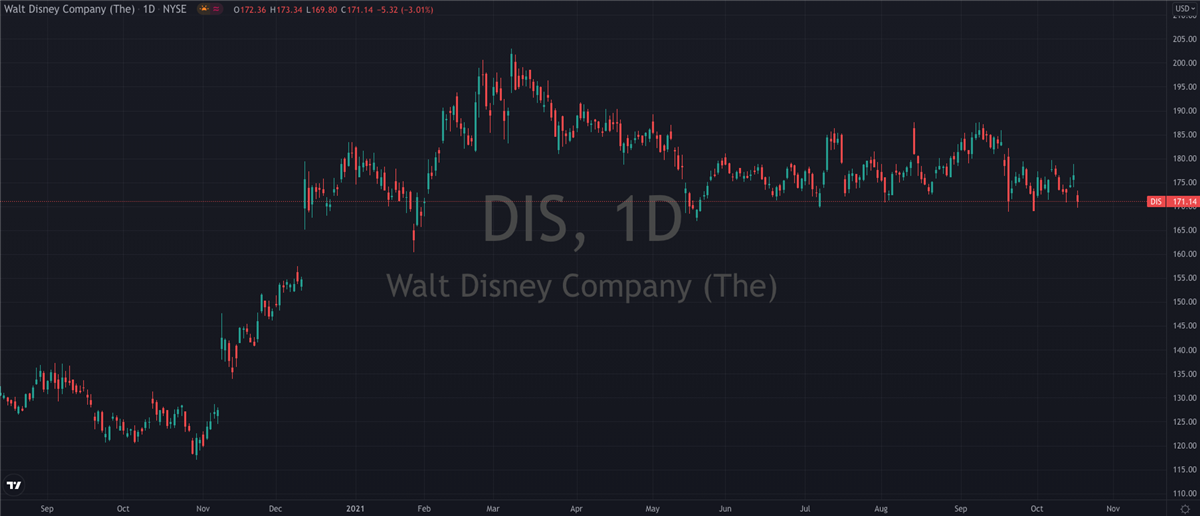Disney (NYSE: DIS) Stumbles, But Does This Open An Opportunity? A 3% drop during Monday's session while most equities finished the day higher would have left Disney (NYSE: DIS) investors feeling a bit miffed.
By Sam Quirke
This story originally appeared on MarketBeat

A 3% drop during Monday's session, while most equities finished the day higher, would have left Disney (NYSE: DIS) investors feeling a bit miffed. The move lower sent them back towards the lower end of the range that their shares have traded in for most of the past year and puts them down close to 10% from the last peak they hit which was in September.
Investors didn't have to look too far however to understand the cause of the drop. The folks over at Barclays hadn't been back from their weekends very long when they were out with a fresh downgrade to Disney shares. They moved their rating on the media and entertainment giant down to Equal Weight, on the basis that Disney's long-term streaming guidance could be at risk. For the previous three years, Barclays had had Disney at a solid Overweight rating so this change of opinion carries a bit of weight.
It boils down to a perceived slowdown in Disney's growth despite what feels like a build-in momentum when it comes to new titles and movie releases. The thinking is that a lot of this perception of momentum is due to what was originally meant to be growth and activity in 2020 that was pushed forward due to the Covid pandemic. Analyst Kannan Venkateshwar and his team wrote yesterday that "in order to get to its long-term streaming sub guide, Disney needs to more than double its current pace of growth to at least the same level as Netflix (NASDAQ: NFLX) which we believe may be tough to do. If Street estimates on the subscriber-growth front are revised lower, it could force a shift in valuation framework away from revenue multiples to an earnings multiple - and assuming peak pre-streaming P/E multiples on present 2024 consensus EPS would imply meaningful downside to the stock."
The cherry on top, if it can be called that for anyone other than the Disney bears, was Barclays price target which was slashed to $174, which is where Disney was trading last week, from what had been a juicy looking $210. The good news for any existing investors is that based on this price target Barclays clearly doesn't see a significant downtrend starting from here.
Bank of America Disagrees
Still, the bearish revision sets up a showdown between two of the bigger sell-side heavyweights, Barclays and Bank of America. The latter was out only last week with bullish comments on Disney's potential to outperform their peer group in the coming months. Analyst Jessica Reif Ehrlich wrote at the time that "we believe the success of Disney+ is a key tenet of the bull thesis and Disney's ability to reaccelerate net adds will be a big focus among investors as the company resumes a more normal content slate and expands into new geographies in FY22". They also see tailwinds in the form of theme park re-openings, direct-to-consumer rollouts in new markets and the resumption of theatrical releases. They reiterated their Buy rating and refreshed their price target at $223.
Weighing The Options
For those of us on the sidelines and considering adding one of the world's most famous brands to our portfolio, there's plenty to chew on here. On the one hand, Barclays think Disney's growth prospects have cooled and that their shares are fairly valued. On the other hand, Bank of America thinks their growth prospects continue to improve and thinks their shares have room to rally by as much as 30%. The easiest, and arguably the safest, approach here of course if you fancy a punt is to open a position around the $170 mark with a tight stop under $167. This is the bottom end of the range Disney shares have traded in since February and a break below there suggests the stock has no interest in retaking $200 in the short term.
To the upside, however, there's much more room for Disney to run, and already in Tuesday's pre-market session their shares were ticking up. It could be that Barclays downgrade caught the market by surprise, but worst case scenario they're right, and Disney is already trading fairly as a result, so the risk-reward profile is quite favorable.









